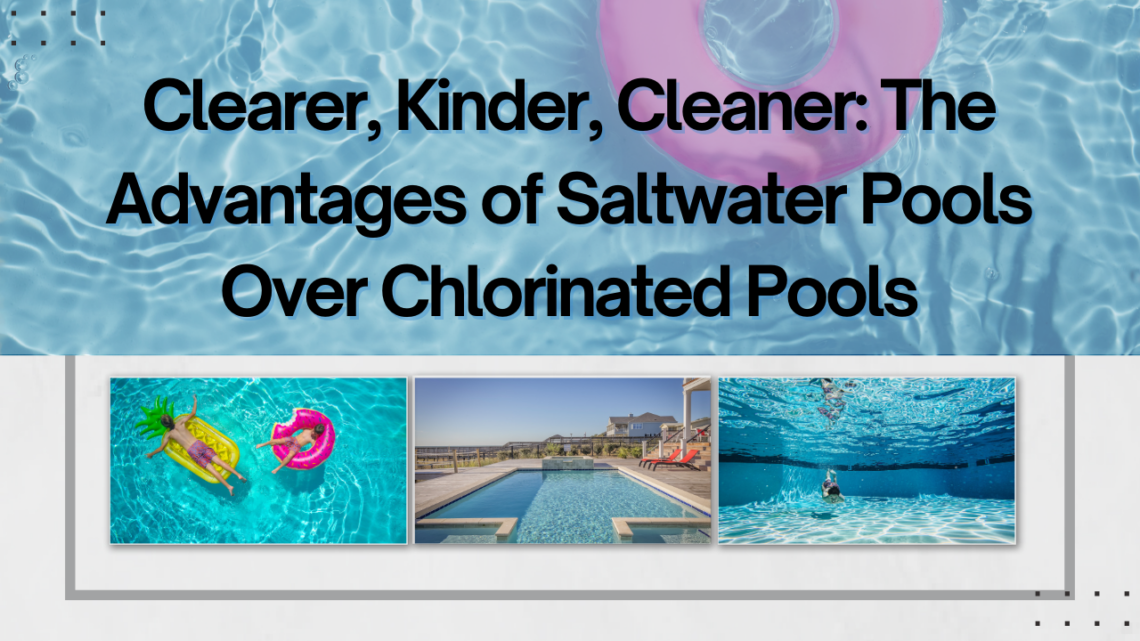To many, a pool is just a pool; a place to splash, exercise, or unwind. However, look a bit deeper, and you’ll find significant differences in how these pools operate, treat water, and even how they feel to the swimmer.
Traditional chlorinated pools rely on manually added chlorine to disinfect and keep the water clear. This method has been the standard for decades, providing a straightforward way to kill harmful bacteria and maintain a pool’s health. Yet, with the progression of time and technology, saltwater pools have begun making waves in the industry. These pools aren’t filled with ocean water, as some might imagine. Instead, they use a clever mechanism: a salt chlorine generator. This device converts plain table salt to chlorine, offering a more consistent and often gentler chlorination method.
While both pool types have their merits, this article shines a spotlight on the numerous advantages of saltwater pools over their chlorinated counterparts. As we dive deeper, we’ll explore why more homeowners, resorts, and even public pools are making the switch, highlighting the clearer, kinder, and cleaner benefits that saltwater systems offer.
Understanding Saltwater Pools: A Definition
A common misconception that many people hold is the belief that saltwater pools are akin to taking a dip in the ocean, merely transplanted into a backyard setting. This notion, though picturesque, is far from reality.
To start with, saltwater pools do not contain ocean water. The term “saltwater” in this context does not suggest that these pools are filled with seawater straight from the coast. Instead, it pertains to the process by which the pool is sanitized. So, if you’re expecting the salinity of the sea in your backyard pool, you’d be in for a surprise.
Central to the operation of saltwater pools is the salt chlorine generator. This is not a gadget that adds a salty oceanic touch to your pool for the sheer aesthetics or feel of it. The device has a critical purpose. By introducing table salt into the pool, the salt chlorine generator takes over, converting this salt into chlorine through a process called electrolysis. When saltwater passes through the generator, an electric current break down the salt molecules, resulting in the production of chlorine. This chlorine then serves the primary purpose of sanitizing the pool, killing bacteria, and ensuring the water remains clear and safe for swimming.
Now, when we talk about the salt concentration in saltwater pools, the levels are much milder than what one might assume. Ocean water carries a salt concentration of around 35,000 parts per million (ppm). In stark contrast, saltwater pools typically have a concentration ranging from 3,000 to 4,000 ppm. This difference is quite significant and ensures that the water in saltwater pools feels fresh and comfortable to the swimmer, without the heavy salinity of the sea.
The Clear Advantages: Why Saltwater Pools Shine
Saltwater pools, once an alternative and niche choice, have now solidified their position as a top contender for new pools and conversions. The reasons are manifold, but they boil down to three primary categories: the enhanced comfort and sensation they offer, the potential health benefits, and the cost and maintenance advantages. Let’s dive into each of these areas to understand what makes saltwater pools so appealing.
Comfort and Sensation
The moment you take a plunge into a saltwater pool, the difference in sensation is palpable. Unlike traditional chlorinated pools, which can often feel harsh and leave a residual chlorine smell, saltwater pools provide a more natural and refreshing experience.
- Softer and Fresher Water Feel The first thing many swimmers note is how the water feels ‘softer’. This is because of the lower salt concentration, which makes the water feel less harsh and more like fresh water.
- No Strong Chlorine Odor Forget about the pungent chlorine scent that lingers on your skin and swimsuit. With saltwater pools, that overpowering odour is a thing of the past.
- Silkier Water on the Skin Swimmers often remark how the water feels silkier, almost spa-like, which leads to a more luxurious swimming experience.
Health Benefits
Beyond the pleasant swimming experience, saltwater pools might also offer health advantages, especially for those with sensitive skin or respiratory issues.
- Gentleness on Eyes, Hair, and Skin The reduced chemical composition means less irritation. Swimmers frequently report less redness in the eyes, less greenish tint in blonde hair, and less dryness in the skin. It is still recommended to shower both before and after taking a dip in a saltwater pool.
- Potential Benefits for Individuals with Respiratory Issues and Skin Conditions The fine salt particles in the water can have therapeutic properties, especially for those with conditions like asthma. The salt can also be beneficial for skin conditions like eczema and acne due to its exfoliating properties. While anecdotal evidence supports these benefits, always consult with a healthcare professional about specific health concerns.
- A Look at Studies Linking Chlorinated Pools and Health Risks Research has shed light on potential risks associated with traditional chlorinated pools. One study suggested a link between indoor chlorinated pools and increased asthma risk in children. While this is just one piece of the puzzle and more research is needed, it’s an area where saltwater pools might have the edge.
Cost and Maintenance Benefits
The advantages of saltwater pools extend beyond just the swimmer’s experience. Owners will find that these pools also shine when it comes to cost and upkeep.
- Long-term Cost Efficiency While the initial installation might be pricier, in the long run, saltwater pools can be more cost-effective. This is primarily because salt, which is abundant and cheap, replaces more expensive chlorine tablets.
- Avoidance of Storing Toxic Chemicals No more storing large containers of chlorine, which can be a hazard, especially in households with children or pets. With a saltwater pool, you only need to handle and store salt.
- Simplicity in Maintenance and Tech-friendly Controls Maintenance is often deemed simpler with saltwater pools. Modern salt chlorine generators come equipped with touch-pad controls or even phone apps, making monitoring and adjustments a breeze for even the least tech-savvy pool owners.
Addressing the Challenges: Cons of Saltwater Pools
While the advantages of saltwater pools are compelling, it’s crucial to provide a balanced perspective by acknowledging the challenges associated with them. These challenges, though surmountable, are essential considerations for anyone contemplating making the switch from traditional chlorinated pools to saltwater systems.
Initial Setup and Costs
One of the most significant deterrents for many considering a saltwater pool is the initial cost. The setup necessitates the purchase and installation of a salt chlorine generator, which can be a substantial investment upfront. Compared to the relatively low starting expenses of traditional chlorine pools, this can be a bit of a sticker shock. However, it’s worth noting that while the initial outlay is higher, the ongoing costs can be lower over time, offering a more cost-effective long-term solution.
Maintenance Intricacies
Owning a saltwater pool isn’t entirely hands-free. There are some unique maintenance tasks to be aware of:
- Salt Cell Cleaning The salt cell, crucial in converting salt to chlorine, can develop calcium deposits over time. This buildup necessitates regular cleaning to ensure efficient chlorine production. While not a difficult task, it does require a periodic commitment.
- Electrode Cell Replacements The electrode cell within the salt chlorine generator is not eternal. Depending on usage and water conditions, it may require replacement every few years. This is a recurring cost to factor into long-term maintenance budgets.
- Salt Storage Challenges While storing large quantities of chlorine is hazardous, storing bulk salt has its challenges. Owners need to ensure they have adequate, dry storage space for the salt, and they must be diligent in ensuring it remains uncontaminated.
Potential Equipment Risks and Climate-related Challenges
- Corrosion Concerns Saltwater pools have a slightly higher risk of causing corrosion on certain types of pool equipment, as well as on any nearby structures made of particular materials. This means extra care must be taken in selecting pool components and in regular pool area maintenance.
- Winterizing in Cold Climates Saltwater pools can pose unique challenges in colder climates where pools need to be winterized. The saltwater system must be adequately protected to prevent freezing and subsequent damage. This can sometimes mean additional winter maintenance steps or equipment.
Health Highlights: The Salty Boost
One of the standout benefits of saltwater pools, beyond their tactile allure, is the variety of health advantages they offer. From providing relief to allergy sufferers to potentially benefiting those with respiratory ailments, saltwater pools are making waves in the health and wellness sector. Let’s dive into these healthful benefits.
Soothing Salinity: A Balm for Skin Conditions
For those battling skin conditions, saltwater pools might be a beacon of relief. The unique properties of saltwater have often been associated with therapeutic benefits for various skin ailments.
- Natural Exfoliation Saltwater can act as a gentle exfoliant, helping to slough off dead skin cells, thereby rejuvenating and revitalizing the skin’s surface.
- Mineral Boost The salt in these pools provides a dose of minerals like magnesium, calcium, and potassium, which are known to offer skin-enhancing properties.
- Reduction in Skin Irritants Unlike chlorinated pools, which can be harsh on sensitive skin and exacerbate conditions like eczema or psoriasis, saltwater pools tend to be gentler, reducing the risk of flare-ups.
However, those with skin conditions should exercise the same caution as everyone else. Showering before entering the pool not only prepares the skin but also minimizes the introduction of impurities into the pool water. A post-swim shower is just as essential, as it washes off any salt residue, ensuring the skin remains clean and hydrated.
For those who frequently indulge in the therapeutic benefits of saltwater pools, considering an upgrade to their shower system or adding a dedicated shower in close proximity to the pool could be beneficial. An optimized shower setup ensures the best pre and post-swim skin care, enhancing the overall pool experience while taking care of sensitive skin.
Breathing and Allergy Relief Benefits
Swimming, by nature, is an exercise that promotes lung capacity and respiratory health. However, saltwater pools may add an additional layer of benefit. The natural saline environment of saltwater pools can act as a saline therapy, often used by allergy sufferers for nasal relief. In this soothing environment, those with allergies might find a noticeable reduction in irritation and inflammation.
Respiratory Advantages for Asthma Sufferers
Indoor pools, especially those chlorinated, have been known to produce chloramines — compounds that can irritate the respiratory tract. For asthma sufferers, this can exacerbate their symptoms. Saltwater pools, on the other hand, present a gentler environment. The reduced presence of chloramines in saltwater pools makes it a more breathable space, especially in enclosed settings. There’s also anecdotal evidence to suggest that the saline environment of saltwater pools can help thin mucus and clear airways, although more research is required to establish this conclusively.
Demystifying Myths: Calorie Burn in Saltwater vs. Regular Pools
One of the myths associated with saltwater pools is the idea that one burns more calories swimming in them compared to freshwater pools. The thought process here stems from the mistaken belief that the body works harder in saltwater. However, the salinity of a saltwater pool is nowhere near that of the ocean, and thus, the buoyancy effect leading to such assumptions is minimal. To set the record straight: the calorie burn between the two pool types is virtually identical. The primary factor determining calorie burn is the intensity and duration of the swim, not the water type.
Conclusion: Making Waves in Water Wellness
Pools have long been symbols of leisure, relaxation, and at times, opulence.
In a world where well-being and sustainability have taken center stage, saltwater pools rise as an embodiment of both. They promise a softer embrace, less reliance on harsh chemicals, potential health benefits, and the allure of long-term cost savings. While they come with their own set of challenges, the benefits, for many, far outweigh the drawbacks.






